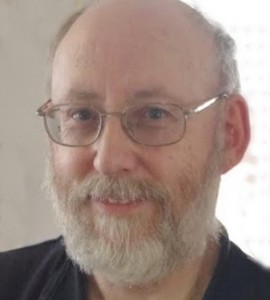
Our Earworms series showcases audio stories from Australian writers. Meet David Grigg, whose audio stories, ‘The Other Car’ and ‘Storytellers’ are available via the links below.
1. Who are the short fiction authors you admire (Australian or otherwise, alive or dead)?
As a teenager growing up in the 1960s, I was strongly attracted to reading science fiction, which of course has a long history of great short stories published in the pulp magazines. At one stage I was fortunate enough to be gifted a collection of such magazines from the 1950s ‘golden age’ of science fiction. So the authors which first come to mind would be the greats of that era – Isaac Asimov, Ray Bradbury, Arthur C. Clarke, Robert Sheckley, Fred Pohl and many more.
Rather later but in the same genre I think of names such as J.G. Ballard, Jack Vance, Ursula K. Le Guin, Cordwainer Smith, Neil Gaiman… it would be easy to create a very long list.
As an adult, I’m still attracted by the fantastic and quirky in fiction. I would have to say that Jorge Luis Borges would top any list of such authors for me.
2.What is the most memorable short story you have read? And why does it stand out for you?
It’s very difficult to choose. Perhaps Borges’ story ‘The Book of Sand’, in which a book collector acquires a mysterious book written in an unknown language and illustrated with strange, gorgeous images. This is interesting enough; but the book appears to have, literally, an infinite number of pages. It is impossible to find the first or the last page, or, opening the book at random, to find a page previously seen. What I like about the story is the wonderful concept of an infinite book, and the way that the protagonist’s view of the book shifts. At first he is fanatically desirous of it, and once in possession of it fiercely protective of his treasure. But eventually he begins to see it as overwhelming and monstrous and is forced to find a way to dispose of it.
Like many of Borges’ stories, this one is set in the prosaic, contemporary world, but introduces an element of the fantastic which throws that world into contrast.
3. What do you like about the short story form?
It can be so focused and pithy, short but with a strong impact. I like stories which make you think. The form is very suited to the exposition of a single idea without being overly diluted by the need for a complex plot or drawn-out character development. I enjoy reading novels too, of course, for just those reasons. But short stories have to get you in quickly, place you within a scenario, get you interested in the characters, and make their point.
4. How would you describe your own writing?
I think I write in a very plain style; my stories are usually set in the modern world or are clearly related to the ‘real’ world, often but not always with some twist or fantastic element. I don’t often write about completely fantastic or futuristic worlds; I like my stories to be grounded in the familiar, and I suppose I’m more interested in character than plot.
5. Which of your stories are you most fond of right at this moment and why?
Again, it’s hard to choose, but I think a short piece called At the Dark Lighthouse is one of the better stories I’ve written. It’s about a young woman in the Victorian era who is being driven mad by the cruelty of her abusive father and suffering a recurring nightmare about a ship being driven onto the rocks.
6. Where do the ideas for your stories come from? (Take us through the genesis of the story published by SW.)
It can be just a news story, something happening in the real world that I can play with and put a twist into. Sometimes it’s been a specific writing prompt; there are blog sites which publish these. I like the challenge of writing to a specific constraint.
In the case of ‘Storytellers’ the prompt was a visual one – just a photograph of a crowded commuter bus, passengers having to stand. I got to thinking about how all of the people on the bus have their ideas about other passengers, ideas which might be quite mistaken in reality. Everyone makes up stories about other people, that was the idea.
7. What is your writing process – from idea to publication? (Do you go it alone or are others involved?)
Once I have an idea I try to plot it out in my head, though sometimes I write down thoughts on approaches. When I’m writing I need to be very focused, so I generally do that by retreating to our local library with just my iPad and a wireless keyboard. I don’t use a feature-heavy word processing application like Microsoft Word, just a simple Markdown-based text editor for the writing itself. Once the first draft is done I generally print it out and re-type the whole thing, making little changes as I go, to reach the next, hopefully final, draft. Only then does it get transferred into Word to produce a manuscript in the format magazines generally want.
On the publication side: I’ve had several of my stories accepted for publication by others, for magazines and in various anthologies. Obviously I work with editors in those cases. I have also published some of my stories online, particularly the very short ones, and recently I self-published two short story collections in print and e-book format. I did everything myself for those books – cover artwork, layout, e-book formatting.
8. What’s the most useful piece of advice you’ve received as a writer?
It’s hard to pick just one. ‘Don’t stop, keep writing’ is one such piece – except that I ignored it and stopped writing for nearly 30 years of my life. I don’t recommend this!
Any number of other things come to mind. Anne Lamott starts her wonderful book Bird by Bird by saying that ‘good writing is about telling the truth’, and Stephen King says something very similar in On Writing. That’s the heart of it, I think.
I also rather like Chuck Wendig’s advice on plot, ‘plot is like Soylent Green: it’s made of people’. In other words, plot emerges from the genuine actions of believable characters placed in a particular situation.
9. How do you feel about your work being published in non-print forms such as digital and audio?
I think it’s great! It just expands the potential to gain readers. Though on the other hand I do like the (relative) permanence of print. The main reason I’ve self-published print versions of my two collections of short stories is to have something which has a chance of surviving until my grand-children are of an age where they might be interested in reading what I’ve written.
David Grigg is a retired software developer who lives in Melbourne, Australia. He worked in the field of interactive multimedia for over two decades, and has also worked in public relations and as a journalist and sub-editor. He is married, with one grown-up daughter and two grand-children. Born in the north of England, he emigrated to Australia with his parents at the age of 13. He has lived in Australia ever since.
During the 1970s and 1980s, David was deeply involved in the science fiction fan community in Australia, publishing fanzines and helping organize SF conventions, eventually becoming Chairman of the 43rd World SF Convention held in Melbourne in 1985.
He is the author of a number of professionally published short stories and two short fantasy novels for early teens. He runs a website called The Narratorium (http://narratorium.com) which features short fiction. He has recently published two collections of his short stories, in both print and e-book format, available at http://rightword.com.au/books
Storytellers written and narrated by David Grigg 9:39 $1.99 
The Other Car by David Grigg 
